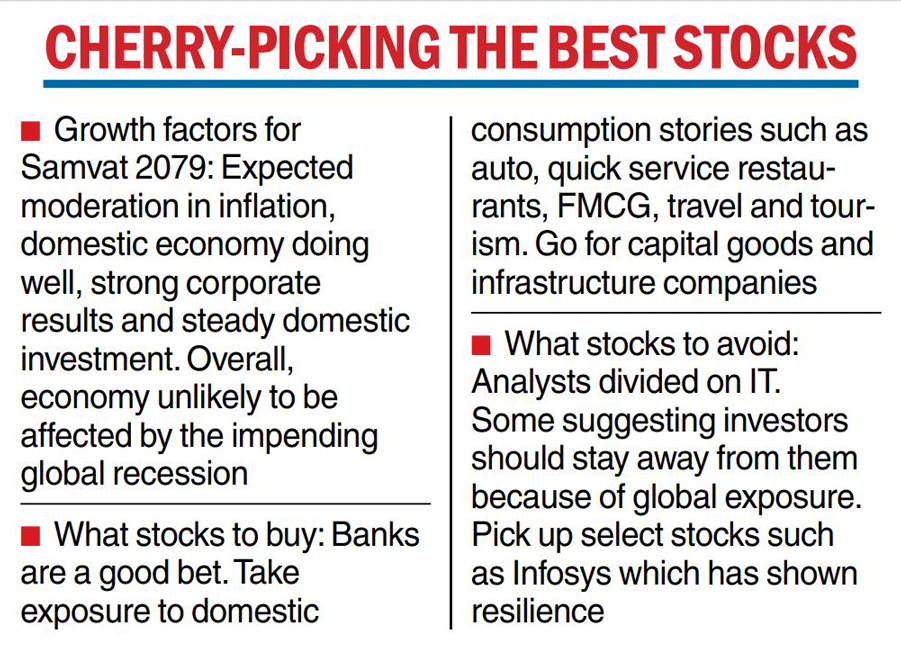After a tepid Samvat 2078 that saw the benchmark indices easing up 1.42 per cent, market mavens are forecasting a better show over the next 12 months — because of moderation in inflation, the domestic economy growing at a faster clip than others, good corporate results and strong domestic flows.
Experts project that the Sensex and the Nifty50 could give a return of 10 to 15 per cent by next Diwali. Based on Friday’s closing, this could put the Sensex at 68000 levels. There are others who are more optimistic and are not ruling out the possibility of the 30-share benchmark index even hitting 70000.
This promising forecast amid turbulent global conditions comes after a disappointing Samvat 2078, which was the worst in seven years.
Though the Sensex fell 464.77 points and the Nifty 252.90 points, the domestic markets outperformed their global peers. This was largely on account of strong domestic inflows from domestic institutional investors and the retail category which offset sales from foreign portfolio investors (FPIs).

Though economists are forecasting challenging times ahead for the global economy with a recession not ruled out in 2023, the view in the markets is that the Indian growth story will not be significantly affected, and this will result in robust corporate earnings.
“Inflation in India most likely peaked in September and the RBI may go for two more hikes after which it will take a pause. Though the global economy will feel the heat of rising interest rates and it will have some impact on India, our economy will not be affected drastically,” an analyst from a foreign brokerage who did not wish to be quoted said.
“Strong domestic consumption will see India outperforming other economies. We are already seeing this in the 18 per cent growth in credit. All these conditions places, the domestic markets in a good stead which even the FPIs cannot afford to ignore.’’ The analyst expects the benchmark indices to rise around 13 per cent by next Diwali.
According to an ICICI Securities note, corporate India could deliver earnings growth in excess of 15 per cent over the next two years given the current economic milieu and this would provide a plethora of investing opportunities in the domestic markets.
The brokerage, however, cautioned in the note that global liquidity flows may create medium-term volatility in the Indian stock markets.
“However, if such a scenario materialises, then the same will be a strong opportunity to take exposure to Indian equities. Our one year forward, Nifty target is at 19425,’’ it added.
Brokerages are of the view that with most of their asset quality issues behind them, banks could be one of the sectors that will shine in Samvat 2079. They are also recommending that investors take exposure to domestic consumption stories such as auto, QSR, and FMCG apart from travel and tourism.
Analysts are also recommending capital goods and infrastructure given the Centre’s focus on these sectors.
Analysts, however, remain divided on the IT sector with some asking investors to stay away given its global exposure whereas others feel that they could go for selective purchases in counters such as Infosys given its resilient performance.
However, Arun Kejriwal, director at KRIS an investment research firm, is more circumspect.
“Though the next 12 months is likely to be better, it does not mean that we will get15-20 per cent returns. It may not be an easy year and investors will have to confront volatility. Though I am optimistic,it is tempered. The key event will be the budget 2023-24,’’ he said.
On Monday, both the BSE and NSE will hold a special Mahurat trading session from6:15 pm to 7:15 pm.











